Archives
-

Perspectivas Journal N° 55
No. 55 (2025)This issue of Revista Perspectivas brings together interdisciplinary research on marketing, entrepreneurship, economics, and finance. It analyzes service evaluation in sports centers in Cochabamba, women's empowerment through family and institutional networks, entrepreneurial barriers for university women in Santa Cruz, the contrast in economic development between Argentina and South Korea (1957–2017), and the importance of financial management control in public universities. Using rigorous methodologies, the studies address current issues and offer practical and theoretical proposals to improve service quality, strengthen gender-focused entrepreneurship, understand divergent economic trajectories, and optimize university management.
-
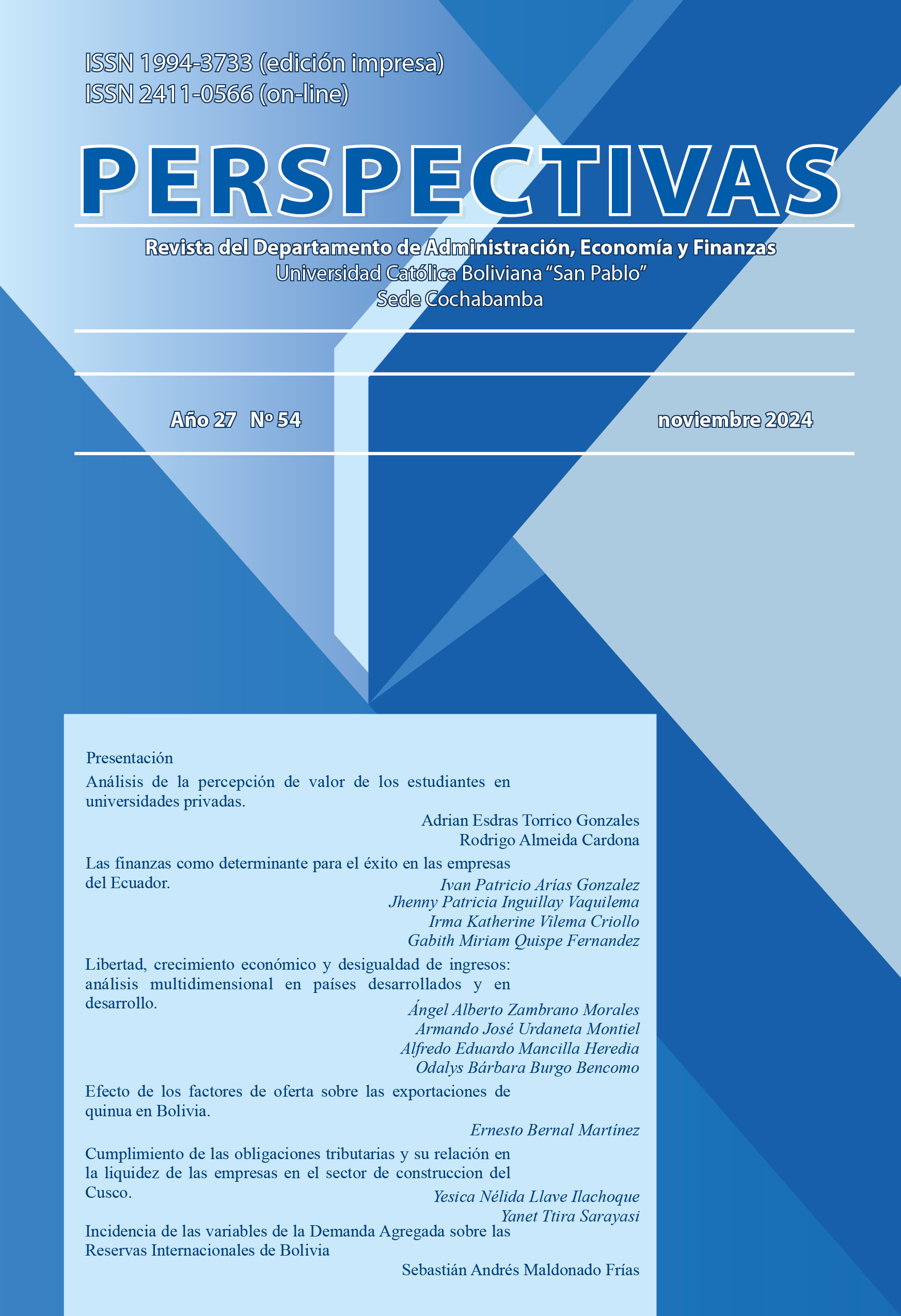
Perspectivas Journal no. 54
No. 54 (2024)This issue of the Revista Perspectivas includes research articles relevant to economic and business sciences, covering topics such as marketing, finance, economics, exports, taxation, and macroeconomics. The first article analyzes how the growth of private universities in Bolivia requires strategies to enhance students' perceived value, highlighting image and perceived quality as key factors. The second explores the impact of finance on business success in Ecuador, emphasizing the importance of social and cultural factors. The third examines the relationship between economic freedom, growth, and inequality, showing that appropriate policies can balance development and equity. The fourth identifies that quinoa exports in Bolivia have been driven by the expansion of agricultural land and international prices. The fifth analyzes how tax compliance improves the liquidity of construction companies in Cusco, with a strong positive correlation. Finally, the sixth article warns about Bolivia’s economic crisis due to declining international reserves, indicating that excessive public spending and a trade deficit are the main causes, and proposes austerity measures and export promotion as potential solutions.
-
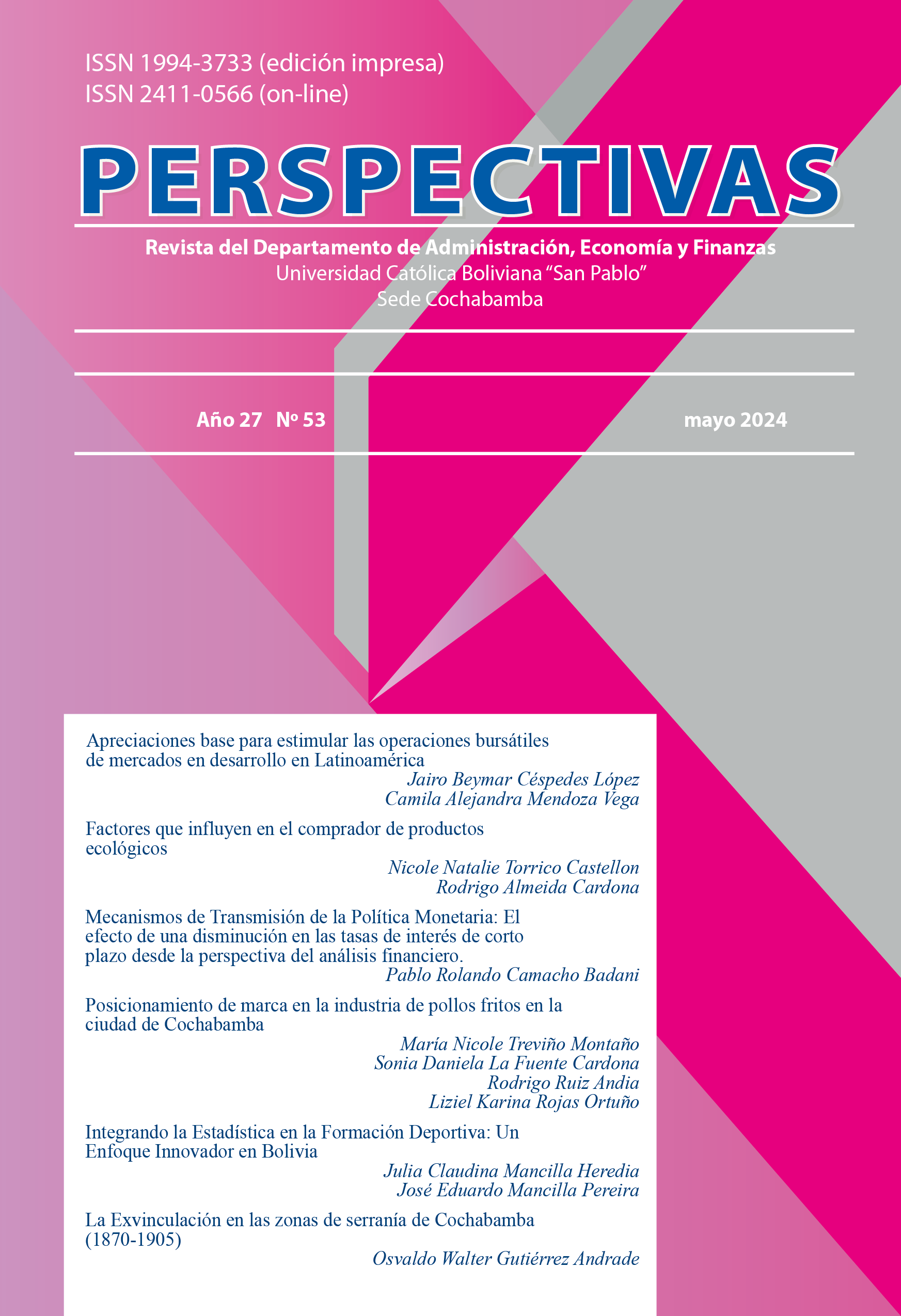
Revista Perspectivas N° 53
No. 53 (2024)This edition presents relevant research in finance, marketing, macroeconomics, innovation, and economic history. The current situation of stock exchanges in Latin America is analyzed, identifying challenges and growth opportunities. The factors influencing young adults in Cochabamba to purchase eco-friendly products are also studied, highlighting attitudes toward green brands and eco-labeling. Another article examines the transmission mechanisms of monetary policy and their impact on price stability. The positioning of broaster chicken brands in Cochabamba is investigated, identifying consumer perceptions and the ideal brand. Additionally, the importance of statistics in sports training in Bolivia is addressed, revealing deficiencies in its application and its relationship with poor performance in international competitions. Finally, the impact of the 1874 Exvinculación Law on the highland areas of Tapacarí is analyzed, partially reconstructing its effects on land ownership.
-
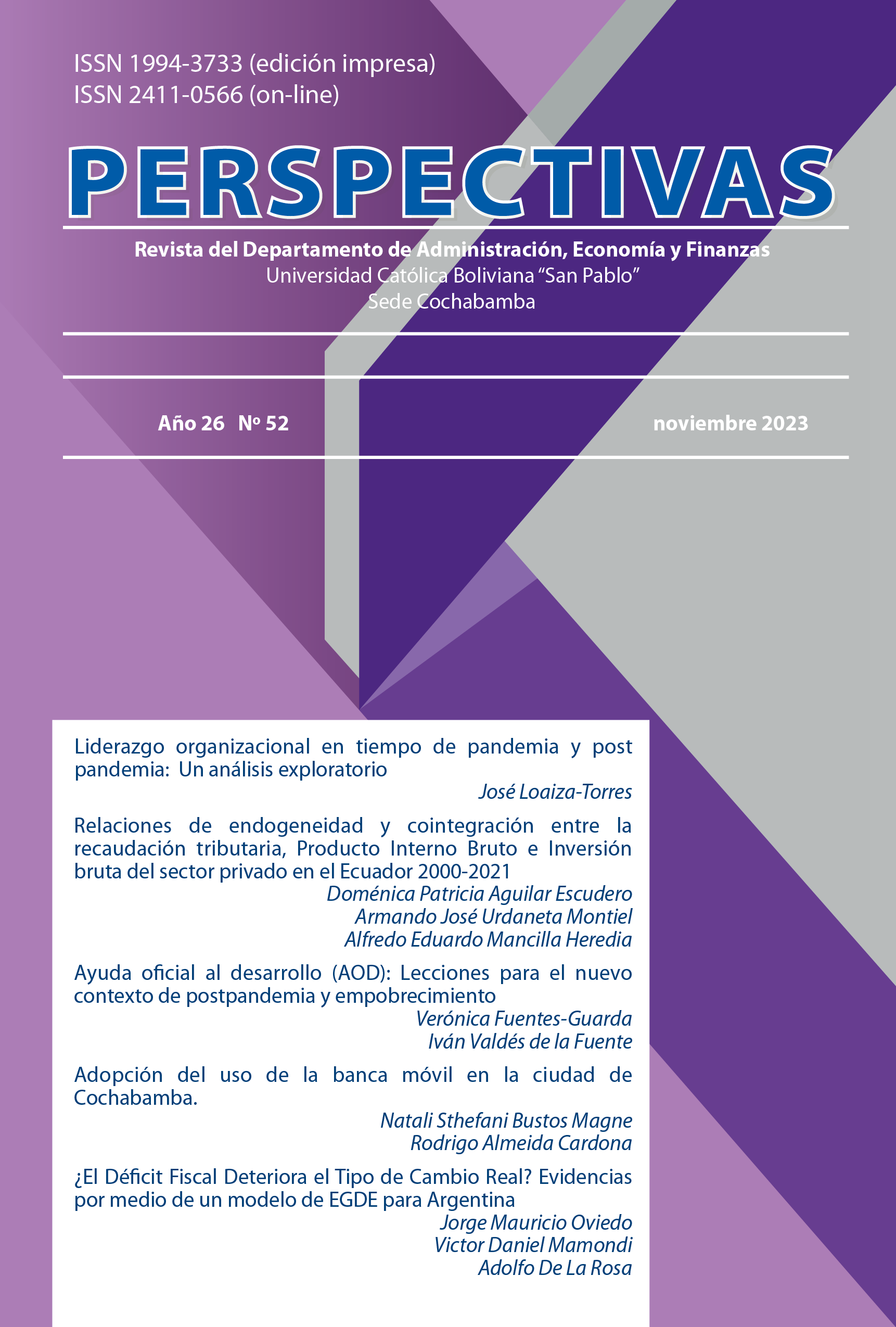
Revista Perspectivas N° 52
No. 52 (2023)This edition covers key topics in leadership, public finance, international economics, marketing, and economic policy. Adaptive leadership in times of pandemic and its role in crisis management is analyzed. Another study examines the relationship between tax revenue, GDP, and private investment in Ecuador from 2000 to 2021, highlighting a long-term connection between these variables. The evolution of Official Development Assistance and its impact on developing countries after the pandemic is critically reviewed. The factors influencing the adoption of mobile banking are also studied, emphasizing the importance of social influence and hedonic motivation. Finally, the effect of the fiscal deficit on the real exchange rate in Argentina is analyzed, concluding that tax reductions improve the exchange rate, while increased public spending deteriorates it, especially when allocated to consumption.
-
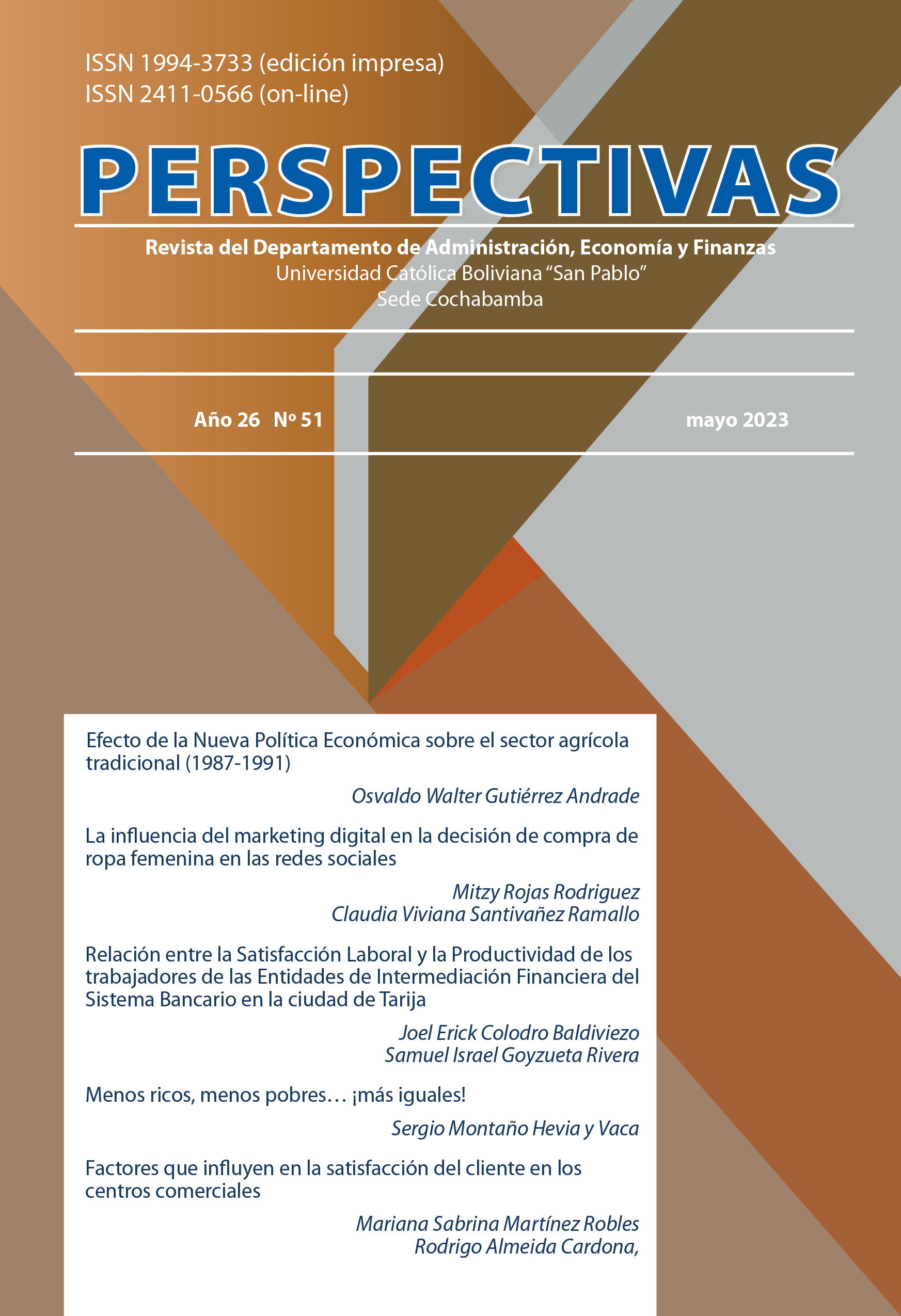
Revista Perspectivas N° 51
No. 51 (2023)This edition presents research on economics, marketing, job satisfaction, and income distribution. The agricultural sector in Bolivia and Cochabamba between 1987 and 1991 is analyzed, highlighting the effects of Supreme Decree 21060 and the New Economic Policy on rural areas. A study on digital marketing evaluates its impact on women's clothing purchase decisions on social media, identifying ease of use and perceived usefulness as key factors. Another article examines the relationship between job satisfaction and productivity in the banking system of Tarija, based on organizational management theories. The dynamics of income distribution in Bolivia and its main departments in 2005, 2017, and 2020 are also addressed, emphasizing the effects of economic inequality. Finally, the factors influencing customer satisfaction in Cochabamba’s main shopping centers are identified using statistical and structural analysis models.
-
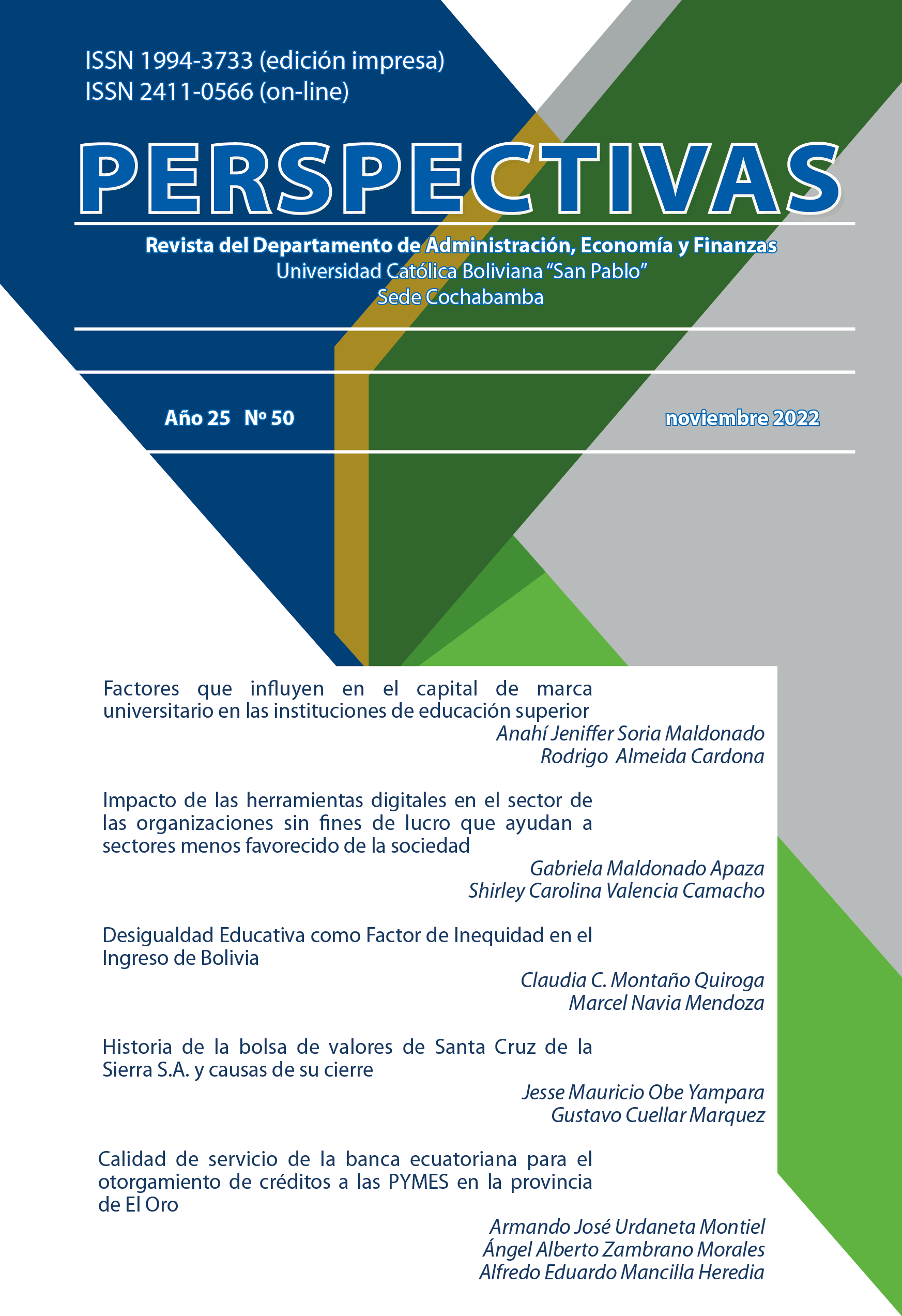
Revista Perspectivas N° 50
No. 50 (2022)This edition presents research on branding, digital communication, income distribution, the stock market, and service quality. The importance of brand equity in universities in Cochabamba is analyzed, highlighting loyalty as the most relevant factor. Another study proposes a digital communication model to strengthen the presence and impact of nonprofit organizations such as Habitat for Humanity Bolivia. The relationship between education and income inequality in Bolivia from 1989 to 2019 is also examined, concluding that educational inequality is the main factor of inequity. A historical analysis of the Santa Cruz Stock Exchange is included, addressing its evolution and the regulatory effects that led to its dissolution in 2005. Finally, the perception of SMEs in the province of El Oro regarding the quality of Ecuadorian banking services is studied, revealing that accessibility, financial knowledge, and customer service are key determinants in service evaluation.
-
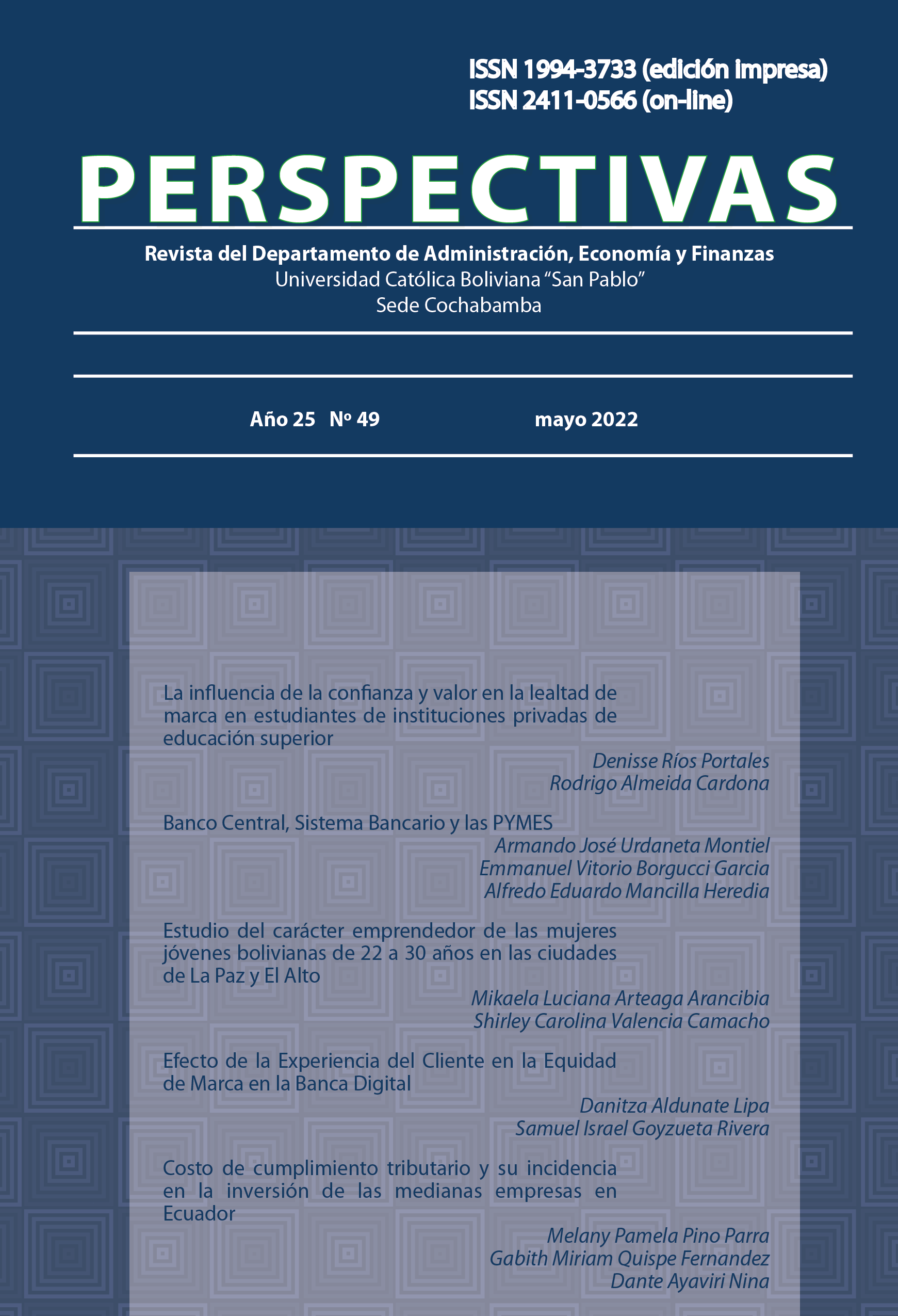
Revista Perspectivas N° 49
No. 49 (2022)This issue presents relevant research in the field of economic and business sciences, addressing topics such as loyalty and trust in private universities, the influence of central bank decisions on SMEs, female entrepreneurship in informal businesses, customer experience in digital banking, and the impact of tax compliance costs on medium-sized business investment. Through these articles, key factors affecting business performance are explored, from customer relationships to tax costs, providing valuable insights for professionals and academics in the sector.
-
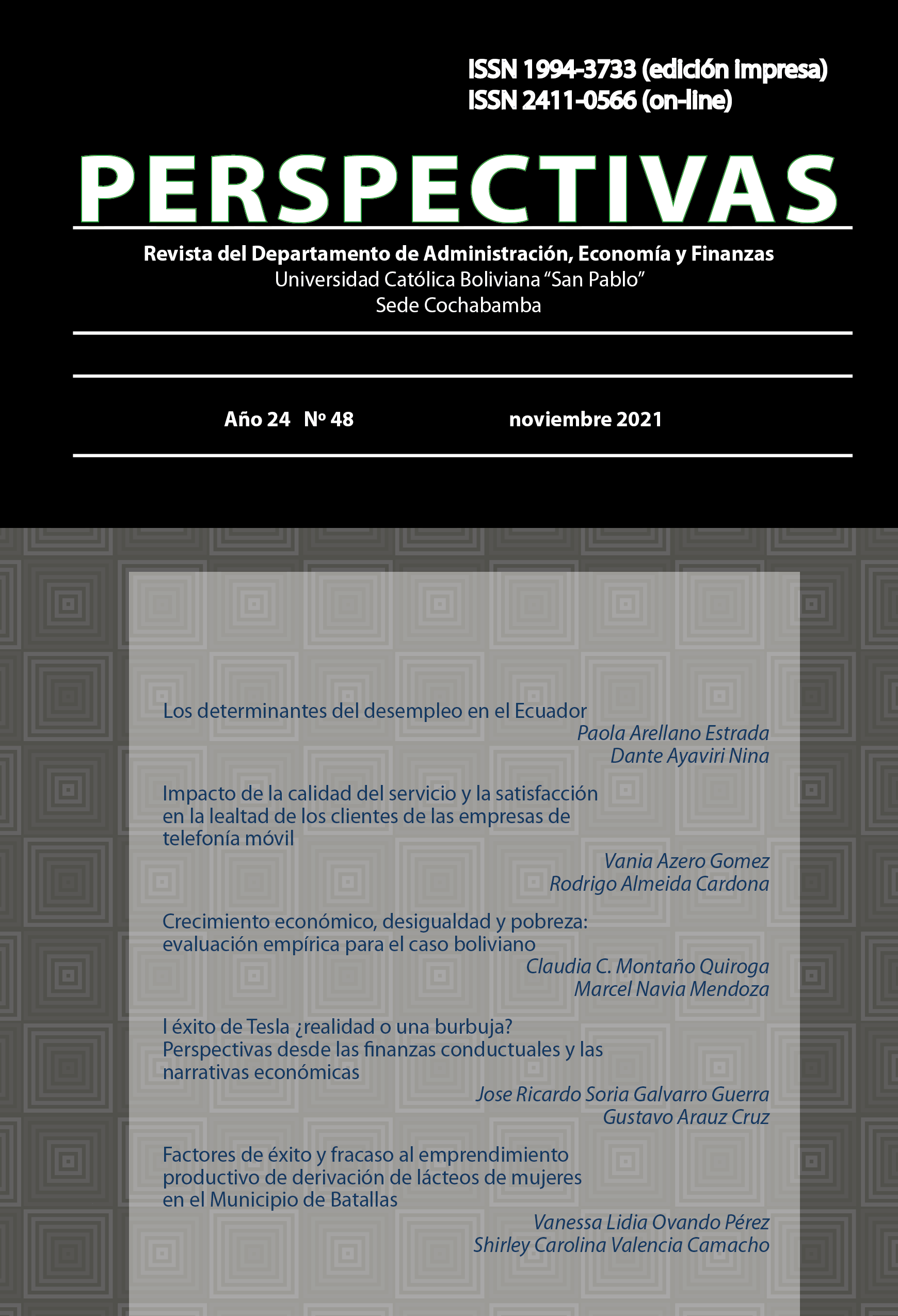
Revista Perspectivas N° 48
No. 48 (2021)This issue offers key research in the areas of economics, marketing, behavioral finance, and entrepreneurship. The first article explores the determinants of unemployment in Ecuador, highlighting the influence of the manufacturing sector, the terms of trade index, capital accumulation, and economic growth on the unemployment rate. The second analysis focuses on the mobile phone industry in Cochabamba, evaluating the impact of service quality and customer satisfaction on brand loyalty. The third article examines the effect of Bolivia’s per capita economic growth on inequality and poverty between 1989 and 2019, demonstrating a negative relationship between GDP per capita and poverty. The fourth study, based on behavioral finance, reveals the overvaluation of Tesla’s stock, emphasizing investor biases and their reaction to news. Finally, the fifth article addresses the success and failure factors of women-led dairy farming ventures in Batallas, analyzing indicators such as educational level, access to technology, and risk-taking attitude. These articles provide valuable insights for professionals and academics across various economic and business disciplines.
-
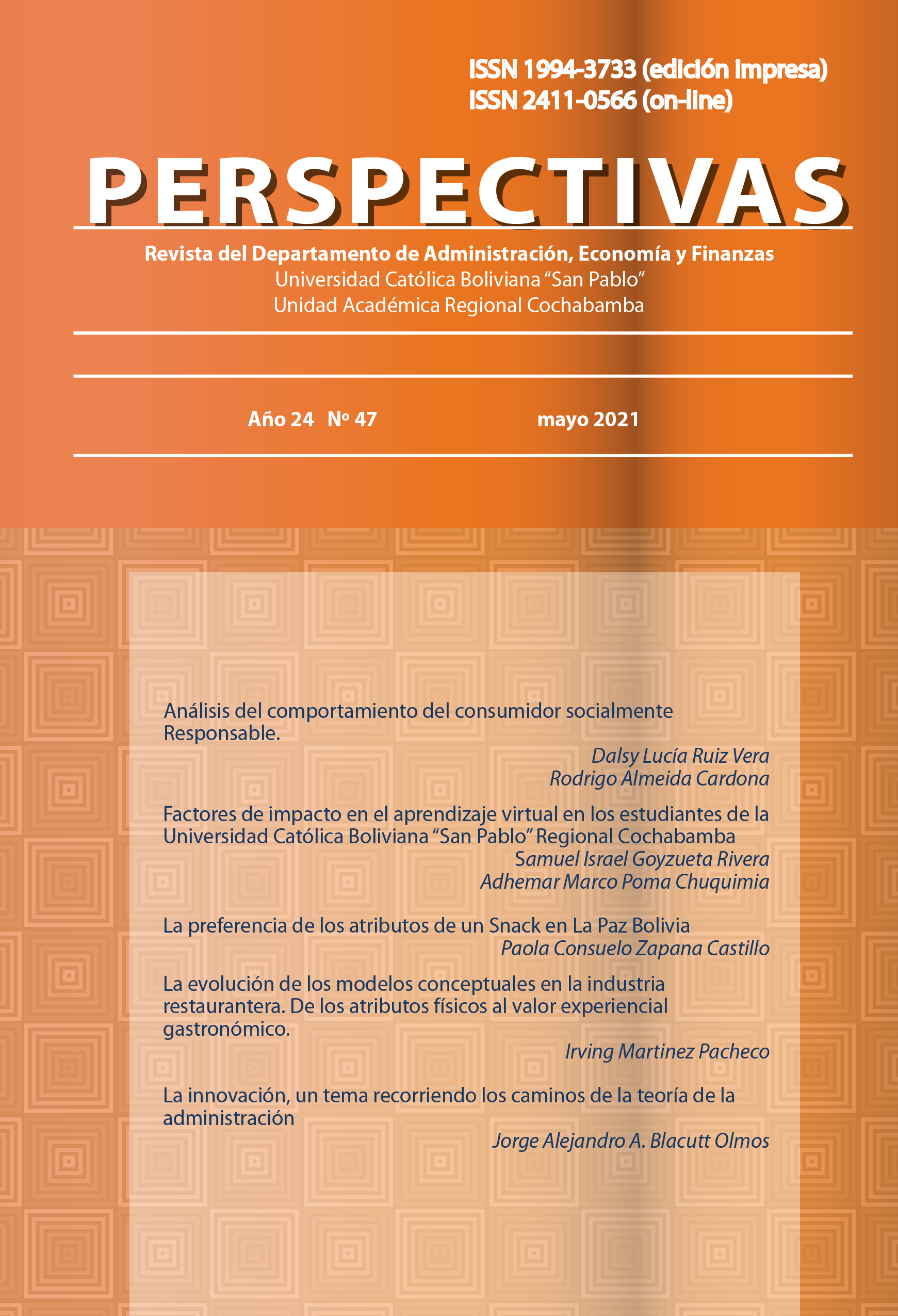
Revista Perspectivas N° 47
No. 47 (2021)This issue includes a series of highly relevant research articles in the areas of marketing, behavioral control, branding, customer perception, and innovation. The first article examines socially responsible consumer behavior in Bolivia, identifying factors such as affective commitment and perceived efficacy as key determinants. The second study explores the factors impacting virtual learning at the Universidad Católica Boliviana, highlighting perceived usefulness and behavioral control as positive influences, while attitude has a negative impact. The third article analyzes consumer preferences in the snack sector, identifying attributes such as brand, labeling, and packaging as the most valued. The fourth article delves into the importance of experiential value in the restaurant industry, emphasizing how the physical environment and innovations affect customer perceptions. Finally, the fifth article explores the concept of innovation in business management, showcasing its evolution from a company-centered approach to a co-creation model of value between the company and the consumer. These articles provide a comprehensive view of key topics in the business and economic fields, offering valuable insights for academics and professionals in the sector.
-
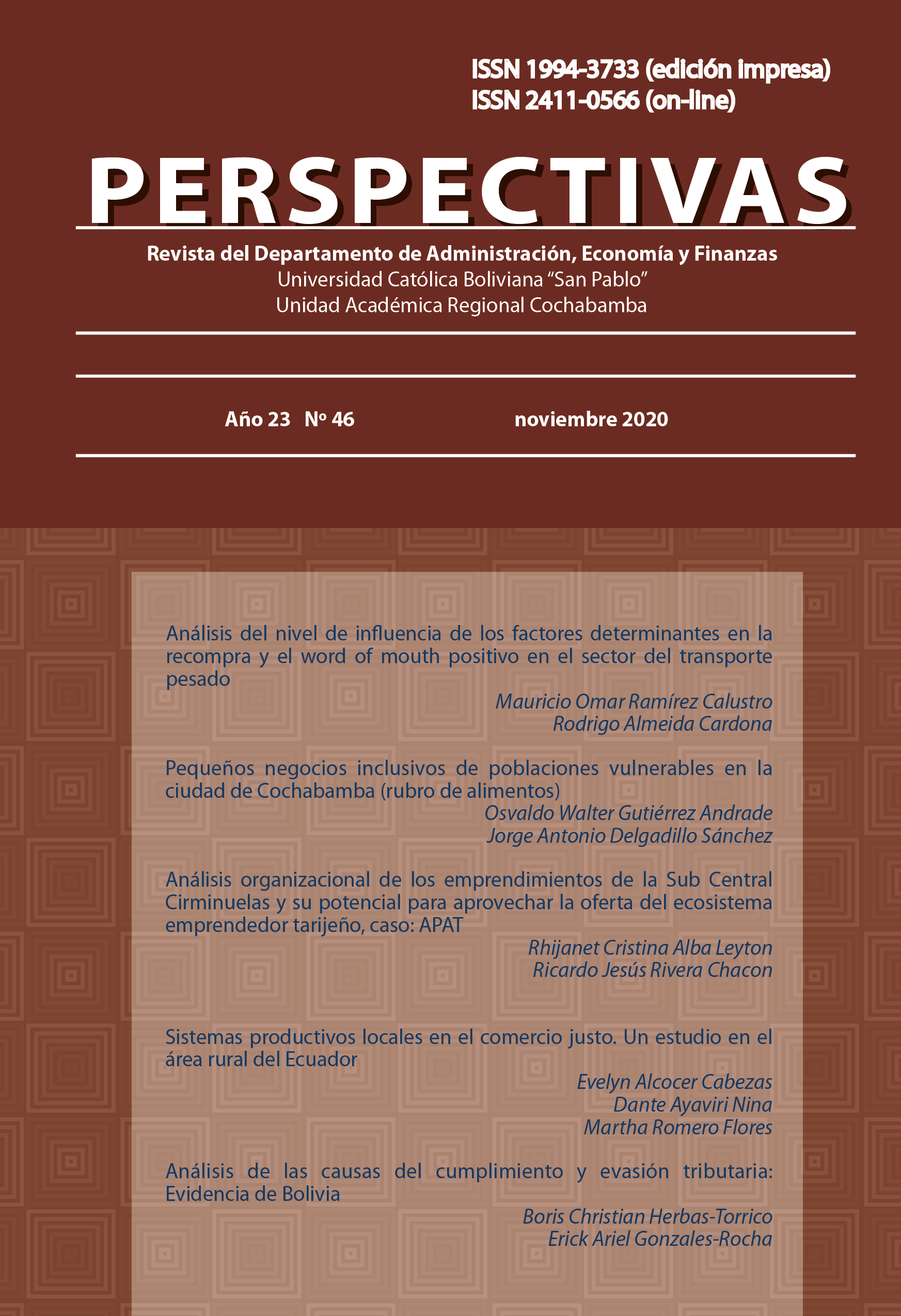
Revista Perspectivas N° 46
No. 46 (2020)This issue presents crucial research for economic and business sciences, covering areas such as marketing, entrepreneurship, production, commercialization, and taxation. The first article analyzes the factors influencing repurchase and positive word of mouth in heavy transportation in Cochabamba, while the second addresses the challenges faced by small food entrepreneurs in the city due to a weak business ecosystem. The potential of agroecological enterprises in Tarija is also examined, highlighting the importance of an organizational structure to leverage the resources of the entrepreneurial ecosystem. Additionally, the relationship between traditional production systems and fair trade in Ecuador is explored, concluding with a study on tax evasion in Bolivia, which proposes measures to improve tax compliance and reduce fiscal evasion. This issue provides valuable insights to promote economic and business development in the country.
-

Revista Perspectivas N° 45
No. 45 (2020)This issue presents key research in areas such as market intelligence, digital marketing, finance, organizational analysis, and accounting. The first article explores the influence of student satisfaction indicators on university quality of life in Cochabamba, highlighting teaching quality and academic reputation as the most influential variables. The second article discusses the importance of a well-managed online presence for businesses, detailing digital marketing tools and SEO and SEM strategies to improve search engine rankings. The third article calculates the beta coefficient for companies listed on the Bolivian Stock Exchange, proposing recommended methods for both listed and non-listed companies. The fourth article analyzes the relationship between work-family balance, good labor practices, organizational commitment, and other variables in a healthcare center. Finally, the last article focuses on accounting and the role of basic financial statements, proposing accounting solutions to enhance the clarity and accuracy of financial information.
-
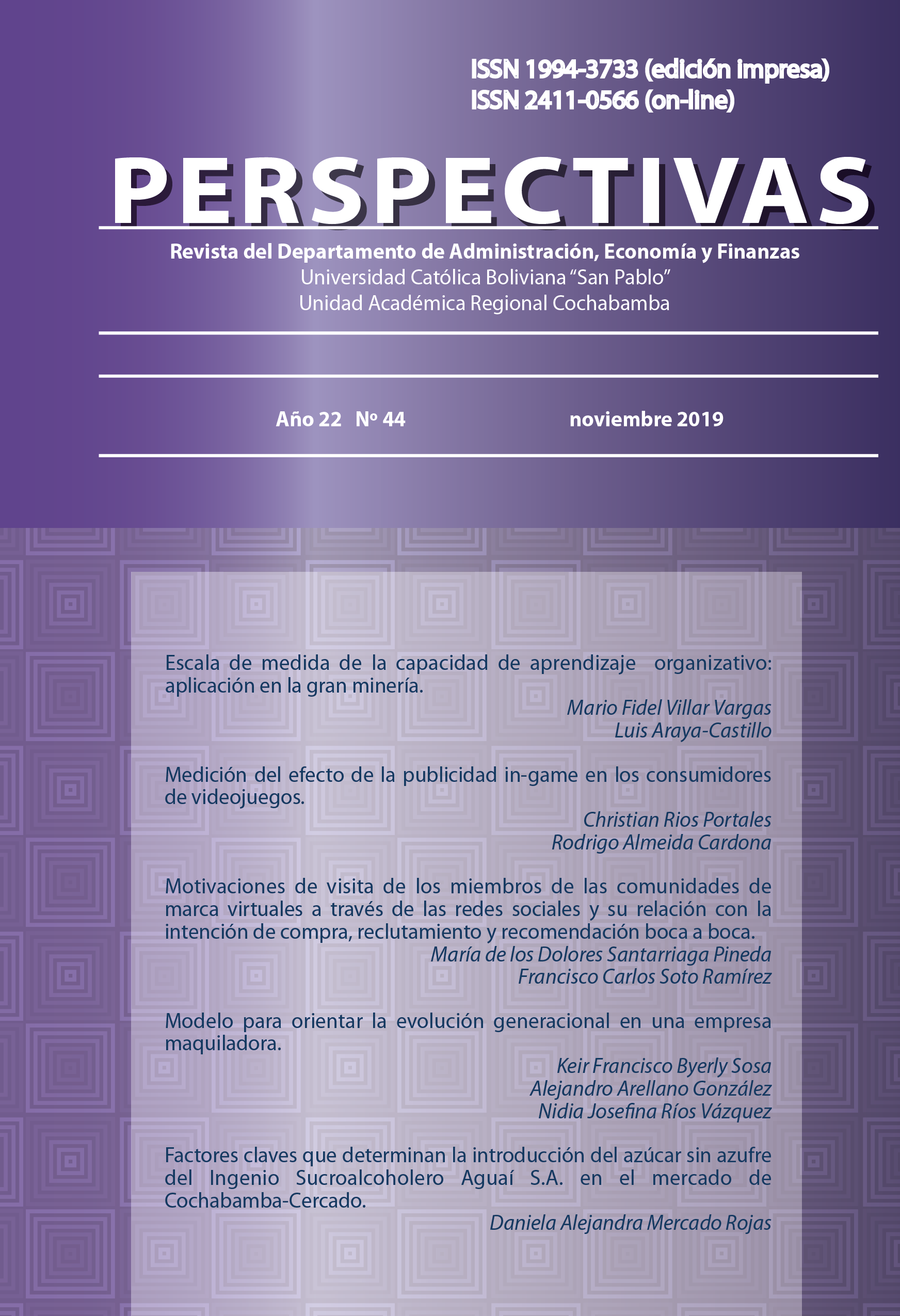
Revista Perspectivas N° 44
No. 44 (2019)This issue presents relevant research in business sciences, covering areas such as organization, marketing, and production. The first article proposes a scale to measure organizational learning capacity in the large-scale mining industry of Antofagasta. The second study analyzes the impact of in-game advertising on video game consumers in Cochabamba through an experimental approach. The third article examines the factors that motivate users to join virtual brand communities, highlighting the search for information and brand affinity with Apple. The fourth article presents a survival strategy for a manufacturing company, based on the development of intellectual capital and organizational culture. Finally, the last study investigates the introduction of sulfur-free sugar in the Cochabamba market, evaluating consumer perception and marketing strategies for its positioning.
-
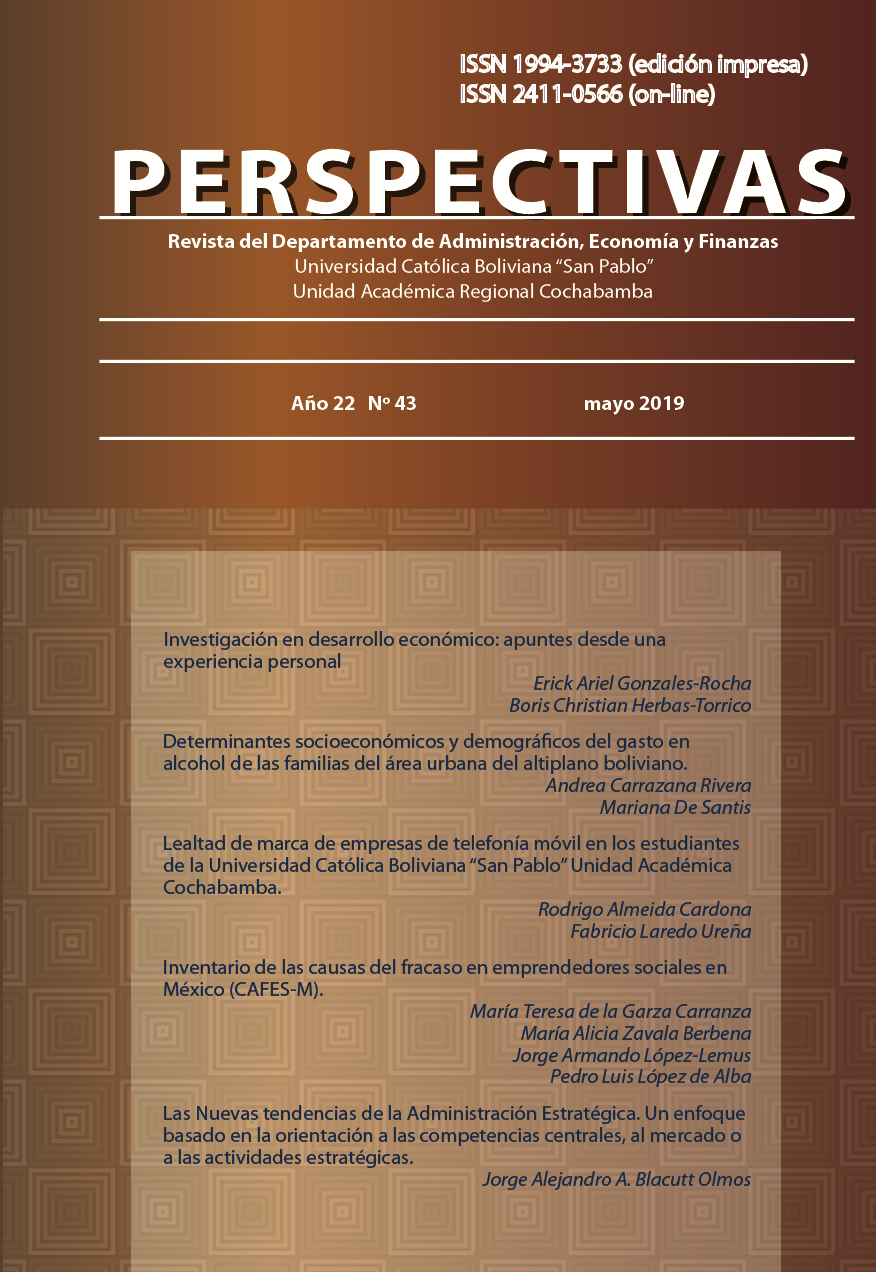
Revista Perspectivas N° 43
No. 43 (2019)This issue presents relevant research in economics, entrepreneurship, marketing, and strategic management. It addresses the importance of academic research in Latin America, the impact of socioeconomic factors on alcohol expenditure, and the determinants of brand loyalty in mobile telecommunications. Additionally, it analyzes failure in social enterprises in Mexico, proposing a validated measurement model, and reviews the evolution of strategic management, highlighting key approaches in business decision-making.
-
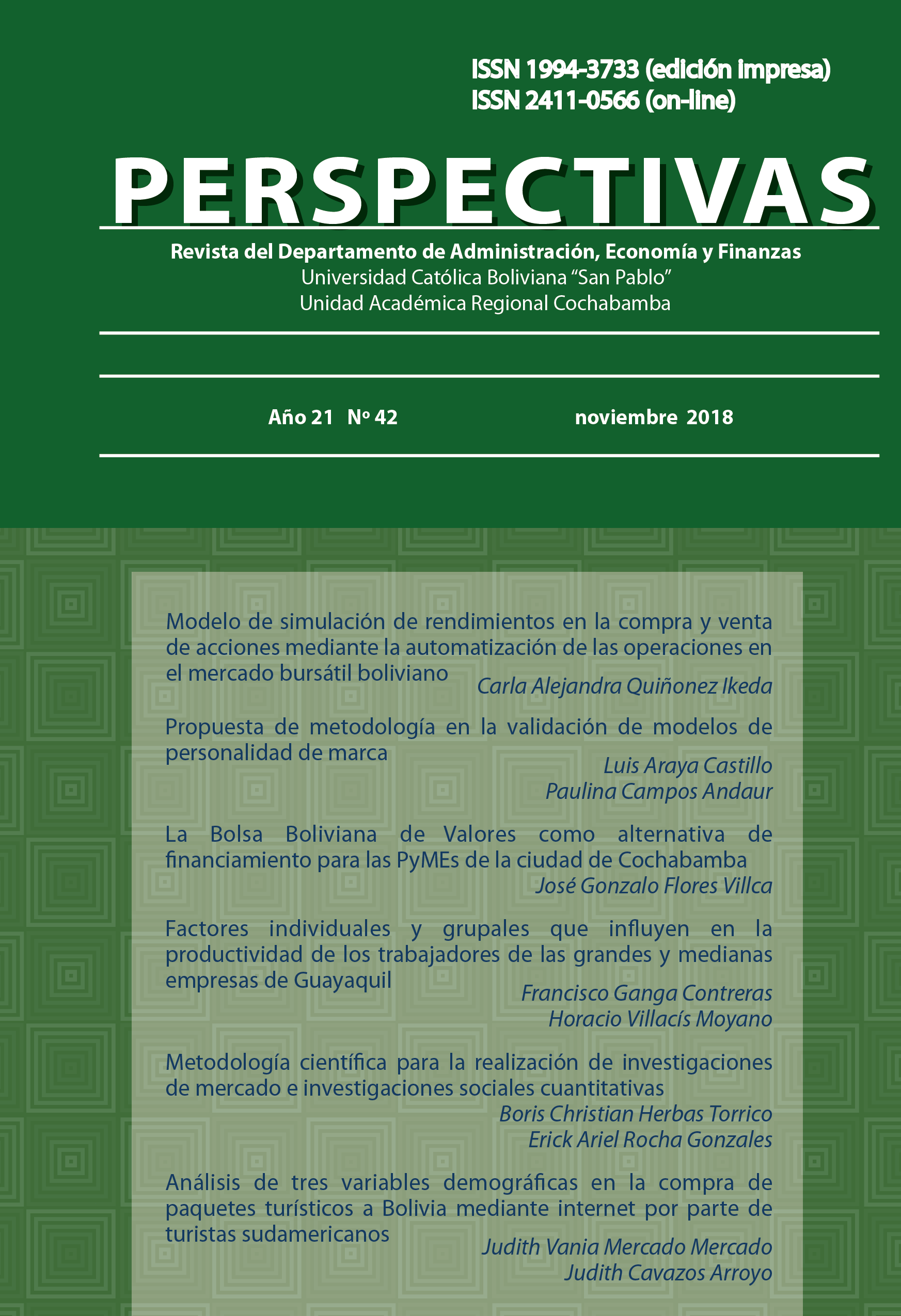
Revista Perspectivas N° 42
No. 42 (2018)This issue presents key research in finance, marketing, production, and international trade. It analyzes the evolution of the Bolivian stock market and an automated model to improve its profitability, the relationship between personality and brand, and financing strategies for SMEs through the Bolivian Stock Exchange. Additionally, it examines the factors affecting labor productivity in Guayaquil, the methodological challenges of research in Bolivia, and the influence of gender, age, and nationality on trust and purchasing behavior in online tourism services.
-
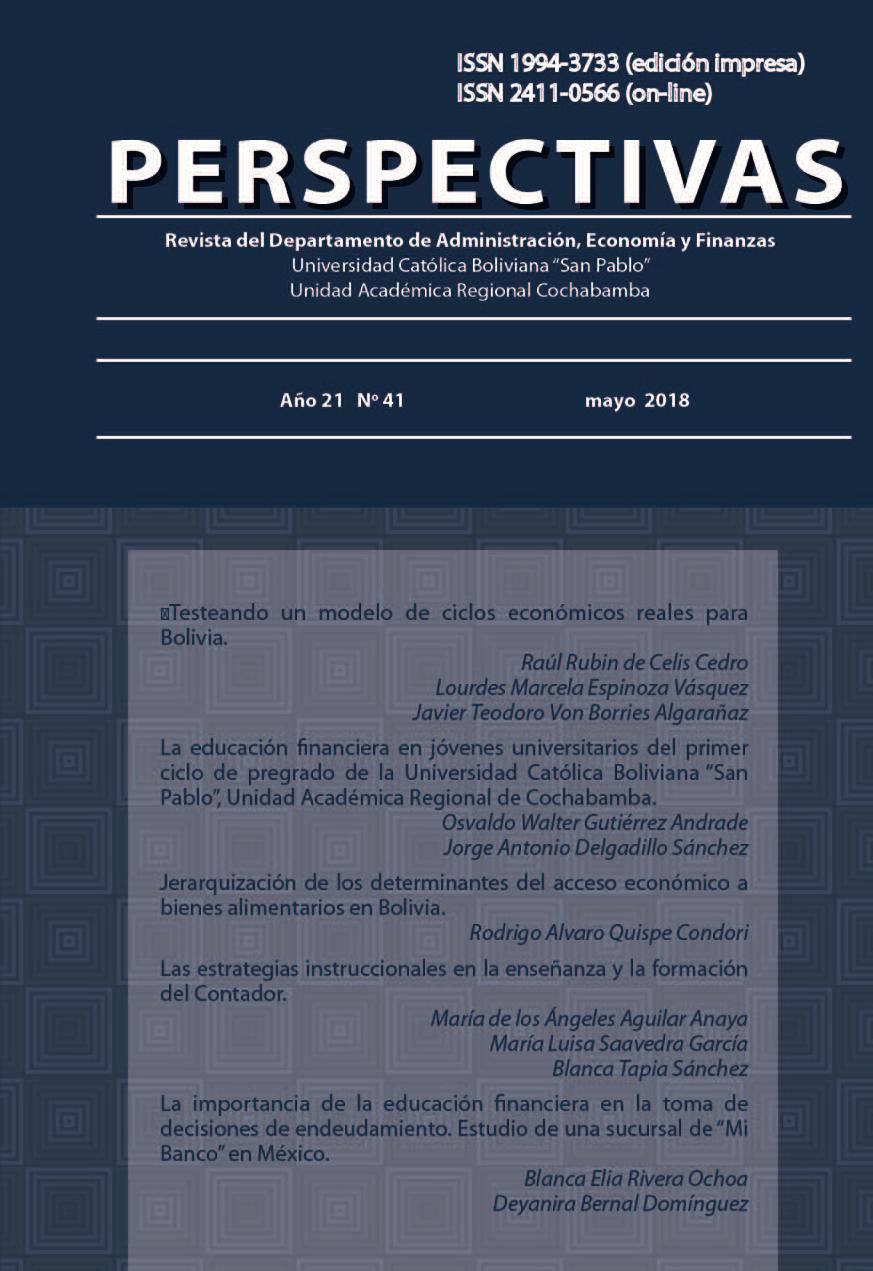
Revista Perspectivas N° 41
No. 41 (2018)This edition presents studies on economics, finance, and education. It analyzes the applicability of Real Business Cycle models in emerging economies like Bolivia, highlighting limitations in their use as a tool for economic policy. The state of financial education among young people is examined, revealing deficiencies in their understanding and application. Another article ranks the socioeconomic variables that influence access to food products. Additionally, instructional strategies for accountant training and their impact on learning are studied. Finally, the relationship between financial education, debt, and credit card usage in Mexico is evaluated.
-

Revista Perspectivas N° 40
No. 40 (2017)This issue presents relevant research in economic and business sciences. It analyzes national and international factors influencing currency crises in Bolivia and the possibility of an early warning system. It also studies the impact of clusters on innovation and entrepreneurship in Riobamba, Ecuador. Another article examines labor turbulence in hotels in Puno and its economic effects. The relationship between leadership traits and transformational leadership in Cochabamba’s banking sector is explored. Finally, the influence of cultural beliefs on property rights protection is investigated.
-
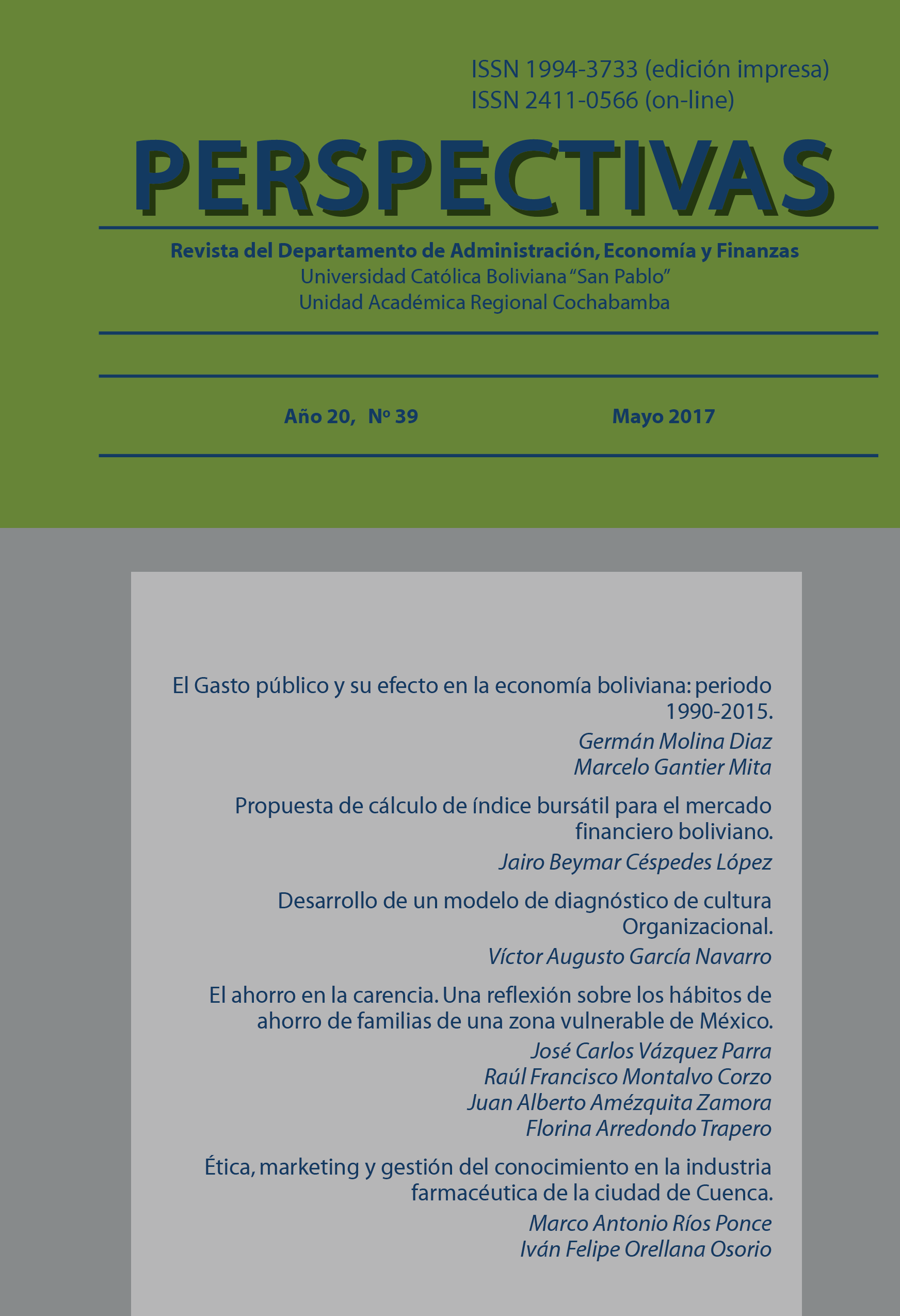
Revista Perspectivas N° 39
No. 39 (2017)This issue covers important research in economics, finance, organizational development, and marketing. It explores topics such as the relationship between government spending and GDP in Bolivia, the development of a stock index adapted to the Bolivian financial market, a model for diagnosing organizational culture in Mexican companies, the structural factors affecting saving habits in vulnerable families in Guadalajara, and marketing strategies in the pharmaceutical industry in Cuenca, Ecuador.
-

Revista Perspectivas N° 38
No. 38 (2016)This issue features highly relevant articles in economic and business sciences, focusing on areas such as marketing, human resources, finance, economic sociology, and pension systems. It begins with a study on the Brand Equity of the Murano brand in the Cochabamba construction market, using the Brand Resonance model to assess its performance and propose improvements. Next, it analyzes workplace harassment, a growing psychosocial risk in organizations, and its devastating consequences for both victims and companies. A comparative analysis of mutual fund performance in Bolivia and other countries in the region is also presented, along with a proposal for an automated model for portfolio structuring. Subsequently, the role of the Bolivian state in the economic sphere is examined, comparing its functioning with that of other countries in the region. Finally, the occupational pension plan system in Mexico is investigated, exploring its relevance and the challenges faced in its design.
-
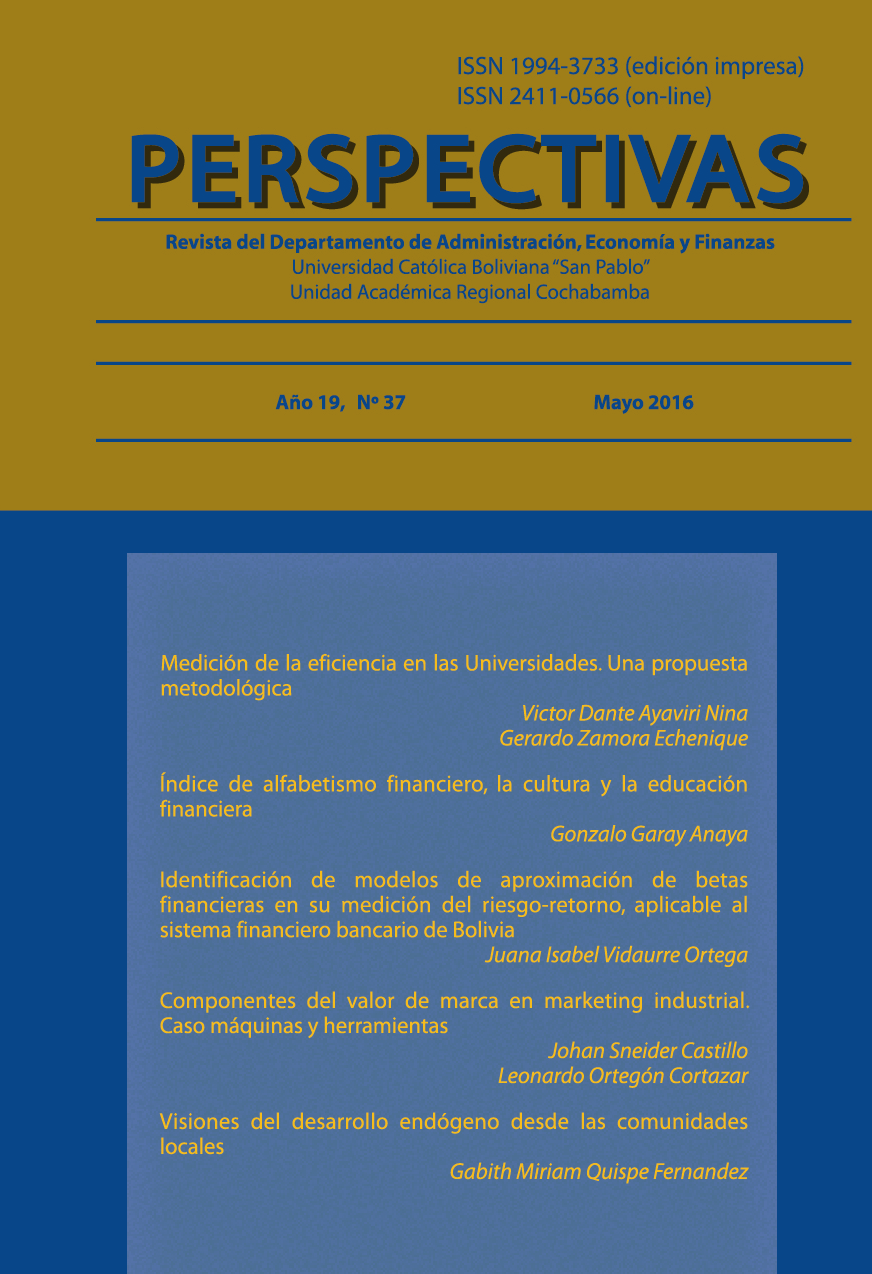
Revista Perspectivas N° 37
No. 37 (2016)This issue presents key articles in the field of economic and business sciences, addressing highly relevant topics. It begins with a study on measuring efficiency in universities, using a methodology that includes technical-productive constraints to improve the evaluation of the higher education sector. Next, it analyzes the low level of financial literacy in Bolivia, suggesting the incorporation of financial education into school curricula to reduce gaps. The issue also covers risk-return measurement in Bolivia's banking financial system, proposing an approach model to the beta coefficient. In the field of industrial marketing, the components of brand value in Colombia’s metalworking sector are explored, highlighting perceived quality and brand associations as key factors. Finally, endogenous development in Latin America is analyzed, identifying that applied development models must enhance local territorial capacities to be effective.
-
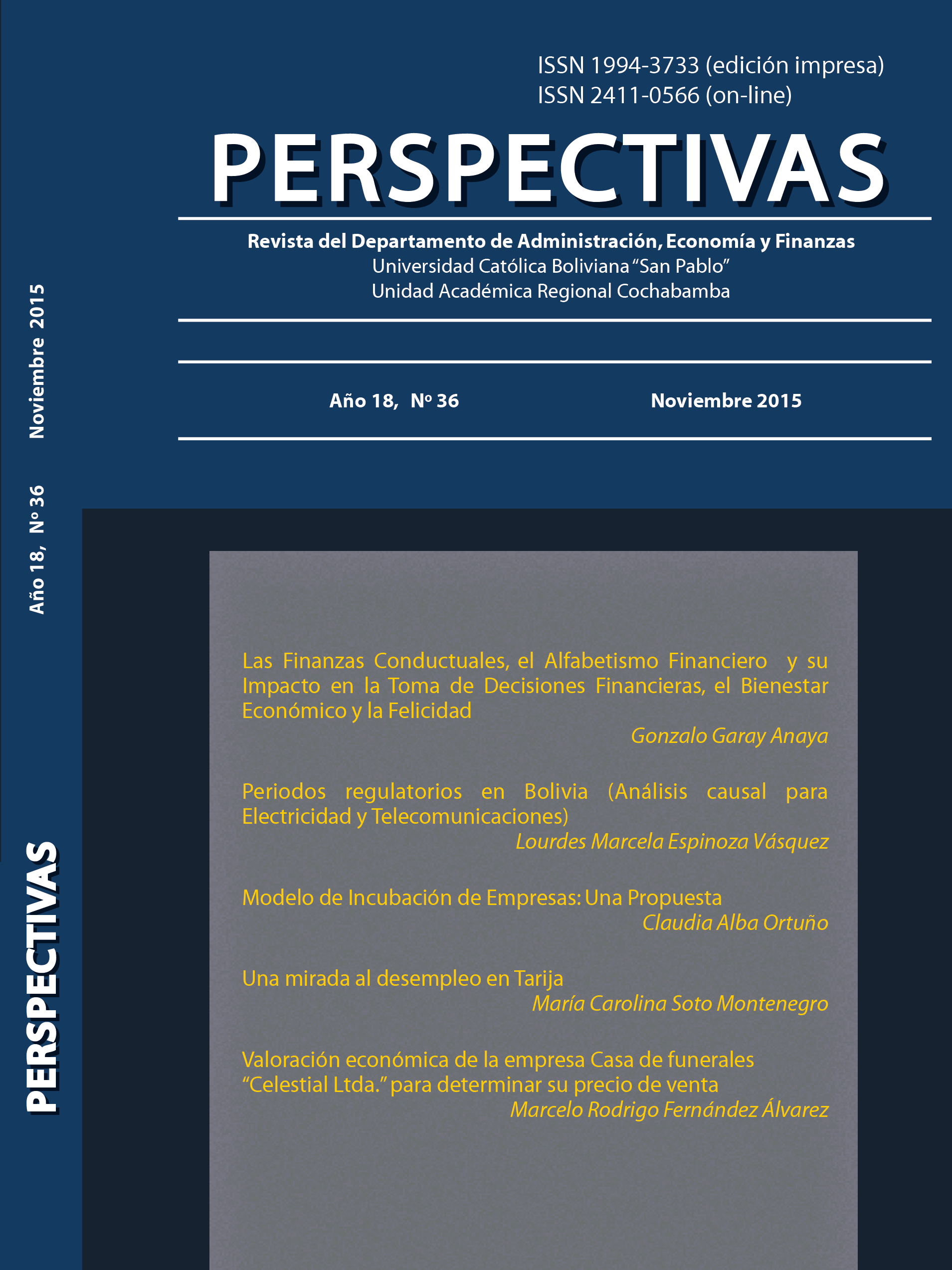
Revista Perspectivas N° 36
No. 36 (2015)This issue presents relevant articles in the field of economic and business sciences. The first study explores the impact of behavioral finance, emotions, and culture on economic decisions and well-being, revealing that these influences affect both economic well-being and personal happiness. The second article analyzes the evolution of regulation in Bolivia’s electricity and telecommunications sectors, aiming to strengthen economic regulation in the country. A model is also presented to systematize the processes of business incubators in Cochabamba, adapting them to local realities. Another study examines unemployment from the perspective of unemployed individuals, proposing solutions and public policies to address this issue. Finally, an economic valuation of the funeral home "Celestial Ltda." is conducted, using profitability-based and accounting methods to determine a fair selling price.
-

Revista Perspectivas N° 35
No. 35 (2015)In this issue, articles address key topics in economic and business sciences. The first article analyzes the essential characteristics for transformative leadership, proposing a three-dimensional leadership model. The second article examines how exchange rate fluctuations impact the competitiveness of Bolivian exports, with a focus on the textile sector. The next study determines the value of the company Automundo Bolivia S.R.L. using two valuation methods, revealing a positive performance trend. Additionally, an analysis of family life from a management perspective is presented, focusing on planning and organization in Tarija’s families. Subsequently, the implementation of a Balanced Scorecard is proposed for the Yanapanakuna farm in Aiquile to enhance its strategic management. Finally, an article explores the concept of Big-Data Marketing, highlighting its relevance in current business and marketing strategies
-

Revista Perspectivas N° 34
No. 34 (2014)This issue addresses key topics in economics and business management in Bolivia. It analyzes the plural economy and its implementation challenges in the country, emphasizing the functionalization and management of the economic model. The impact of motivation policies on human resources at the Cooperativa de Telecomunicaciones Oruro Ltda. is examined, identifying key factors for job satisfaction. A solution is presented to improve the accounting and financial management of the microenterprise Yanapanakuna through a cost system aligned with accounting regulations. The relationship between happiness and variables such as education, income, wealth, and security in Latin America is investigated, concluding that traditional determinants have a low correlation with subjective satisfaction. Finally, the service quality of the advertising company Ayuda Experto is measured using the Servqual model, evaluating customer perceptions in key dimensions such as reliability, security, and empathy.
-

Revista Perspectivas N° 33
No. 33 (2014)This issue presents articles on economics and business management in Bolivia. It analyzes user perceptions of microcredits in Cochabamba through qualitative and quantitative studies. Bolivian municipalities are classified into homogeneous clusters based on demographic and socioeconomic variables, facilitating the design of development policies. The impact of economic growth and environmental risk on GDP per capita is examined, highlighting agro-ecological investment as key to sustainable development. Food security in Bolivia is studied through macroeconomic and macrosocial indicators, revealing economic and social barriers to food access. Finally, a management control model based on the Balanced Scorecard is proposed for PISABOL S.R.L., a company dedicated to producing salt-based food products.
-

Revista Perspectivas N° 32
No. 32 (2013)This issue addresses topics related to consumer behavior, education, and the knowledge society. It analyzes the behavior of OMO Multiactivo consumers in Cochabamba through statistical studies. Consumer perceptions of quinoa are studied, and a positioning strategy is proposed to promote its consumption. Market preferences for fresh heart of palm in Cochabamba are also examined using qualitative and quantitative methodologies. Another article investigates the influence of state economic policies on potato production in Bolivia between 1974 and 1993, concluding that these policies negatively affected the traditional agricultural sector. Finally, the issue reflects on the knowledge society and its impact on education, highlighting its limitations in solving global problems.
-
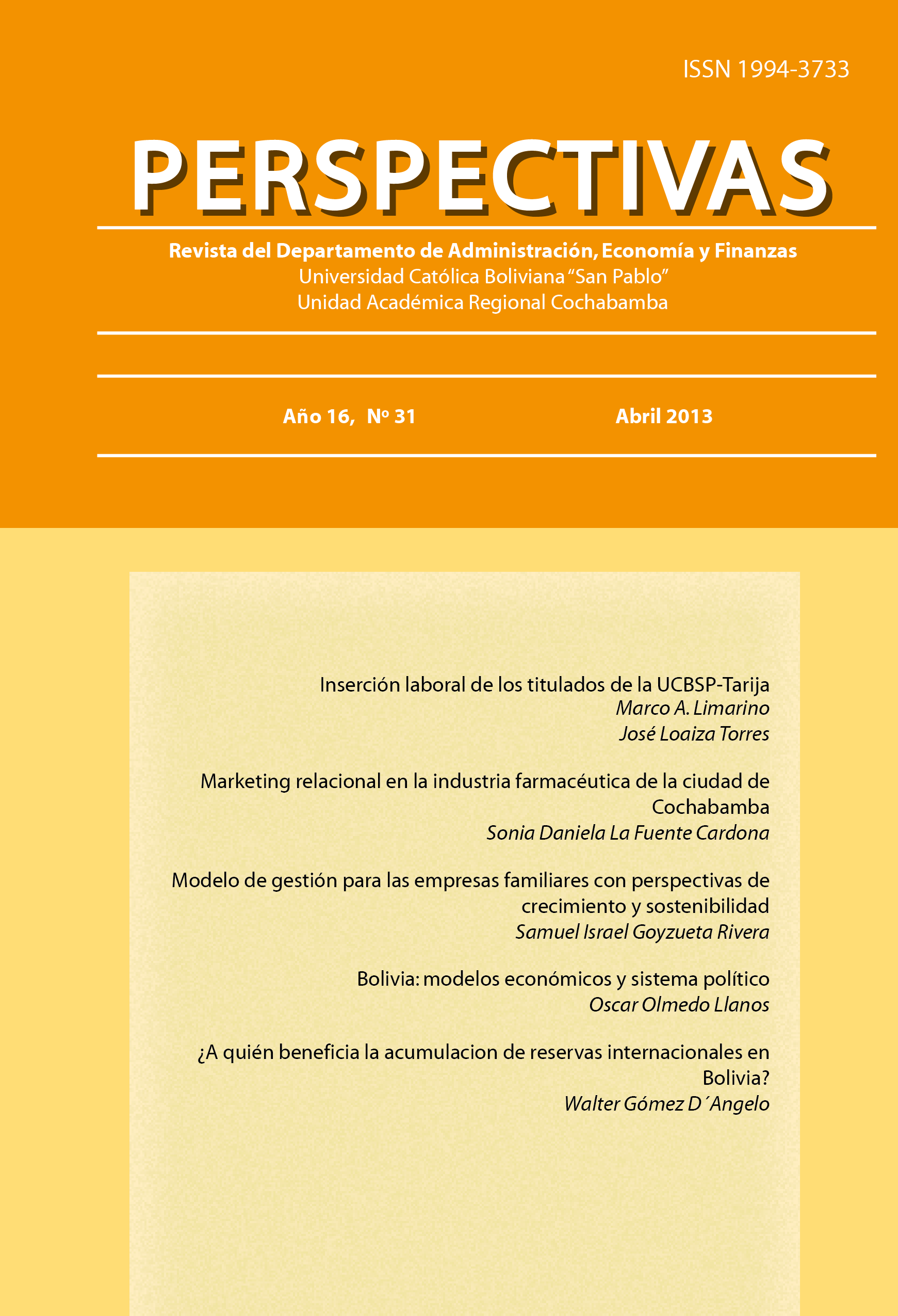
Revista Perspectivas N° 31
No. 31 (2013)This issue addresses topics related to the labor market, marketing, business management, and economics. It analyzes the labor market integration of UCB graduates, highlighting that most find employment without major difficulties. The applicability of relationship marketing in Cochabamba’s pharmaceutical industry is studied, emphasizing the importance of market knowledge and strategic planning. Another article presents a management model for family businesses, distinguishing between family, business, and ownership systems. Economic models in Bolivia are also examined, pointing out the alternation between statist and market-oriented approaches in different periods. Finally, a critique of the excessive accumulation of International Reserves is presented, arguing that it has led to regressive income redistribution and an overvaluation of the exchange rate.




